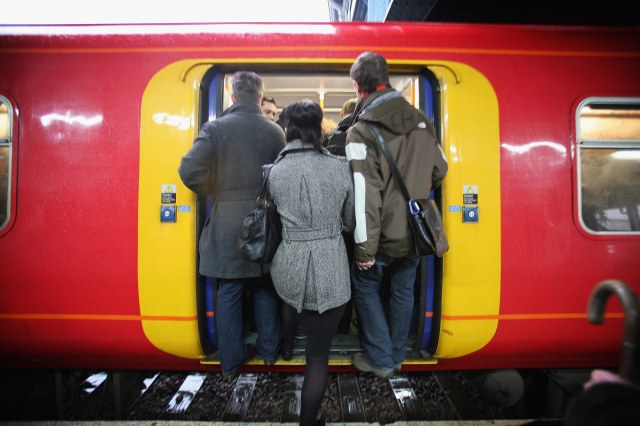Commuter hell at Clapham Junction. Credit: Dan Kitwood / Getty

‘Despite Brexit’, London is booming. The place is a forest of cranes, as the world’s top architects compete to make the ugliest mark on the city’s skyline.
Office blocks need office workers, hence the multi-billion pound upgrades to London’s dense rail network. Once down-at-heel termini, such as London Bridge and St Pancras, look more like international airports now – and poor old Euston, devastated by 1960s redevelopment, is set to follow (as part of the HS2 mega-project).
But amid all that activity Gwyn Topham reports for the Guardian on a possible counter-trend :
“Rail passenger numbers in the UK fell last year to 1.7bn in the biggest decrease since privatisation in the 1990s, casting fresh doubt on the viability of struggling franchises.
“According to figures published by the Office of Rail and Road, usage fell by 1.4% in the 2017-18 financial year, the first annual fall since 2009-10 and the biggest since 1993-4.”
What could be going on? It’s certainly not due to rising unemployment, which in the UK is at multi-decade lows. Nor has London property become so cheap that people can suddenly afford to live in town.
It’s true that there was disruption to rail services in the first quarter of this year as a result of ‘severe weather conditions’ (Brit-speak for a bit of snow); but there’s evidence to suggest that something deeper is afoot:
“Season ticket sales have plummeted 9.2%, suggesting commuters no longer place the same faith in the rail network, when fares have risen inexorably while services are beset by strikes and overcrowding…
“An industry source said: ‘There were four or five franchise agreements which relied on massive growth rates … instead of which we are seeing them in decline. There is a structural problem here which could dwarf the timetabling issues, because it is more widespread.’”
The train operating companies, particularly those serving the London commuter lines, have long relied on a captive market. All the while that it continues to prosper as a global city, and as long as sky-high property prices force workers to live outside of the capital, the assumption is that commuters have no choice but to buy season tickets – no matter how steep the fare increases or how unreliable the train services or how lousy the customer experience.
But when you bet your whole business plan on a key assumption, there’s one vital question that must be asked: how could it possibly be wrong? That’s an open question, by the way, not a rhetorical one.
In the case of train companies, the flaw in the assumption is that commuters have no alternative. That’s not because the internet has turned us all into telecommuters. Indeed, one of the ironies of the digital age is that physical proximity to colleagues, clients, and suppliers is often at a higher premium than ever before – hence the growing importance of global cities. And yet, what people are also realising is that proximity isn’t needed all of the time. Indeed, there’s a point at which face-to-face becomes in-your-face and you need to get away just to get some work done.
Working from home for at least part of the week isn’t just something that employers increasingly allow, but increasingly require – because it enables them to reduce desk-to-employee ratios and hence the eye-watering cost of renting office space in London.
Topham quotes a representative of the train companies:
“‘While technology may mean fewer people are travelling into work every day, anyone taking the train into our major cities will know that investment to run more trains is essential.’”
If commuters don’t have to come in everyday, then, often, there’s also no reason for them to arrive first thing on the days when they are in, meaning they don’t need to travel peak time or buy a season ticket.
While this enables commuters to substantially reduce their travel costs, it has the makings of a revenue crisis for the train companies – and indeed for those other rent-seeking monopolists, London’s landlords.
And what a shame that would be.










Join the discussion
Join like minded readers that support our journalism by becoming a paid subscriber
To join the discussion in the comments, become a paid subscriber.
Join like minded readers that support our journalism, read unlimited articles and enjoy other subscriber-only benefits.
Subscribe